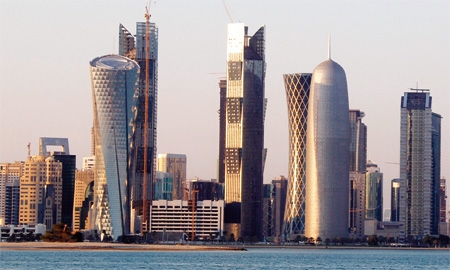This milestone is also a challenge as for almost a decade now, the share in Qatar’s GDP of the hydrocarbon sectors has been, on average, 57%. The key challenge is to both diversify away from an economy mostly reliant on hydrocarbon industries and also diversify its energy sector for more added value.
“Now the question is whether you remain a world energy supplier or you transform yourself and provide more in order to become an energy player,” says Nasser Al-Jaidah, CEO of
Qatar Petroleum International. “QPI was born for that reason, in order to leverage QP’s strength."
QPI’s strategy for upcoming years is to add more and larger upstream activities to its portfolio, eventually having 50% upstream and the other 50% downstream. “We are creating a unique business model internationally, creating new frontiers of collaboration with international companies with transparency and stability,” adds Mr. Al-Jaidah.
And as if consolidating its position over competing LNG exporting nations weren’t enough cause for celebration, the 77 Mta Celebration Event happened to coincide with another exciting first for the country: winning the bid to host the 2022 World Cup.
In economic terms, Qatar is not just strong; it is also stable. While many countries are just beginning to rebound from the economic recession, other economies are waiting patiently for those players to get back in the game. Qatar has mainly observed the financial crisis from a near, yet comfortable distance.
The government’s prompt intervention in supporting local banks in December 2009, the solid levels of liquidity, and the state’s sound pre-recession economy have been major factors in safeguarding Qatar. The country achieved a remarkable growth in GDP of 11% in 2009, and an even more impressive 19% last year. Predictions for 2011 are equally optimistic at 18%.
Recent developments include changes at Qatar Financial Center (QFC) aimed at further boosting the finance sector’s contribution to economic diversification. QFC announced it will refocus on fostering the asset management, captive insurance and reinsurance industries. Yet another boom to the sector is the newly formed partnership between the Qatar Exchange (QE) and the NYSE’s Euronext, whose 20% stake ($200 million) represents its largest investment in a foreign exchange and first step into the Middle East.
At the same time, the government unified the regulation of its financial services sector under a single body, creating a clearer framework for foreign operators.
“A single regulatory body will feed confidence to Qatar’s economy,” comments Minister of Finance Yousef Hussain Kamal. “It will also be easier to have better governance overall with a single regulator. This will ultimately be beneficial for both the receiver and the supplier of finance, with better transparency.”
New reforms, new opportunitiesQatar is proving to be a highly stable GCC country, thanks to its prudent macroeconomic and natural resource management.
Now, Qatar is making even greater strides towards reinforcing its economy and attracting foreign investors. In the region FDI has been curtailed by restrictions on business ownership outside the free zones. To the approval of the local business community, three sectors have been fully opened: consultative and technical work services, technology, and distribution services. Under the amended law, foreigners can also own a higher share of companies in agriculture, industry, health, education, tourism, and natural resources development.
While the new law will surely encourage investment in a variety of sectors, thus falling in line with the diversification efforts of Qatar’s National Vision 2030, it is the hydrocarbon industry itself that has boosted the non-oil industry. The wealth generated by oil and gas has allowed for a higher purchasing power and consequently a greater demand for products and services. Non-oil manufacturing in the GCC region has grown over the past decade, increasing its contribution to GDP from approximately 1% to 10%.
While the main economic driver will remain hydrocarbons for many years to come, the government believes it is possible to build the banking, insurance, telecom, IT and other sectors around oil and gas.

0 COMMENTS